Role of Clinical Supervision in Supporting Mental Health Nursing Practice
VerifiedAdded on 2023/01/06
|12
|3422
|65
AI Summary
This report critically evaluates the role of clinical supervision in supporting safe and effective mental health nursing practice. It discusses the current clinical supervision arrangements in ACSA and provides recommendations for improvement.
Contribute Materials
Your contribution can guide someone’s learning journey. Share your
documents today.
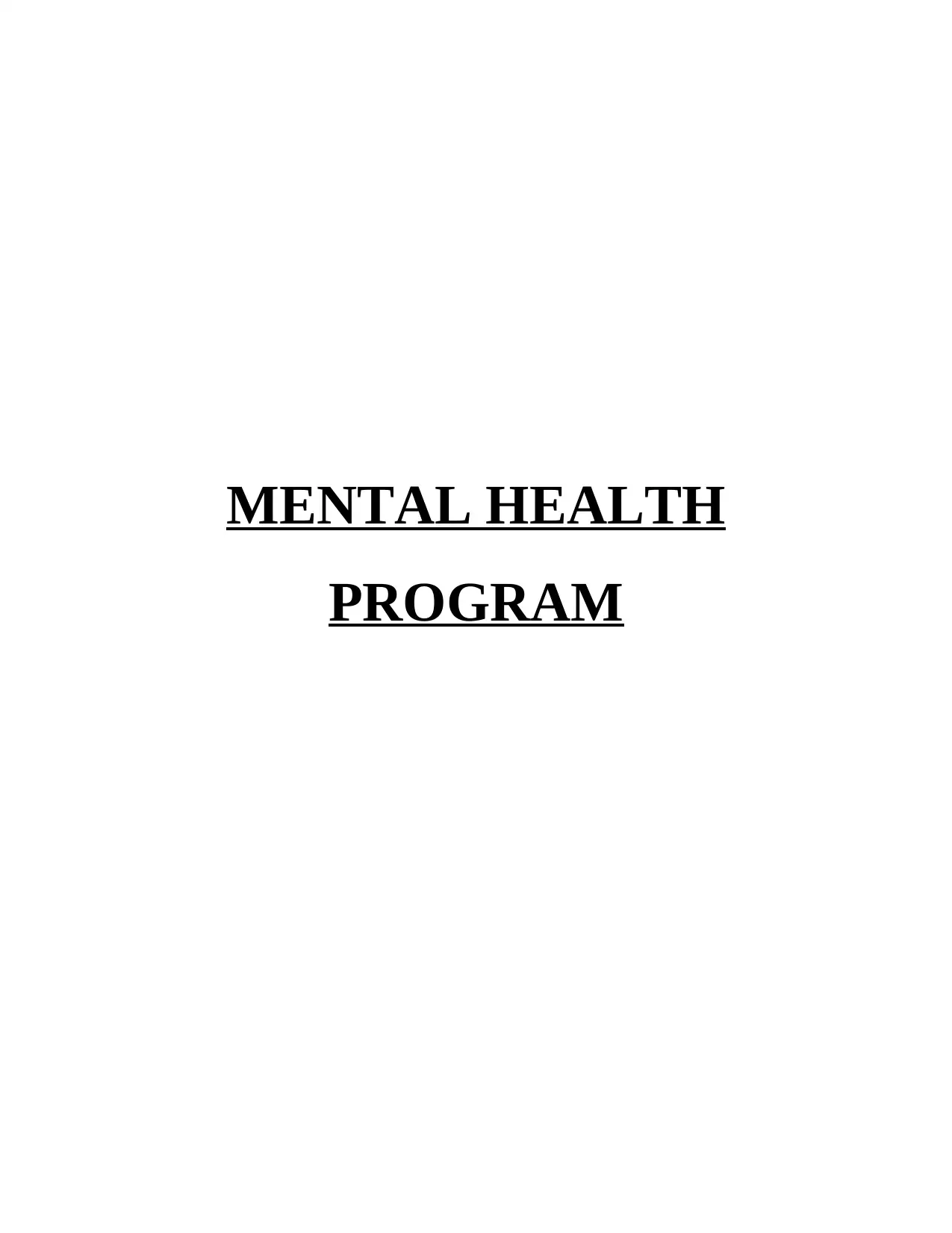
MENTAL HEALTH
PROGRAM
PROGRAM
Secure Best Marks with AI Grader
Need help grading? Try our AI Grader for instant feedback on your assignments.
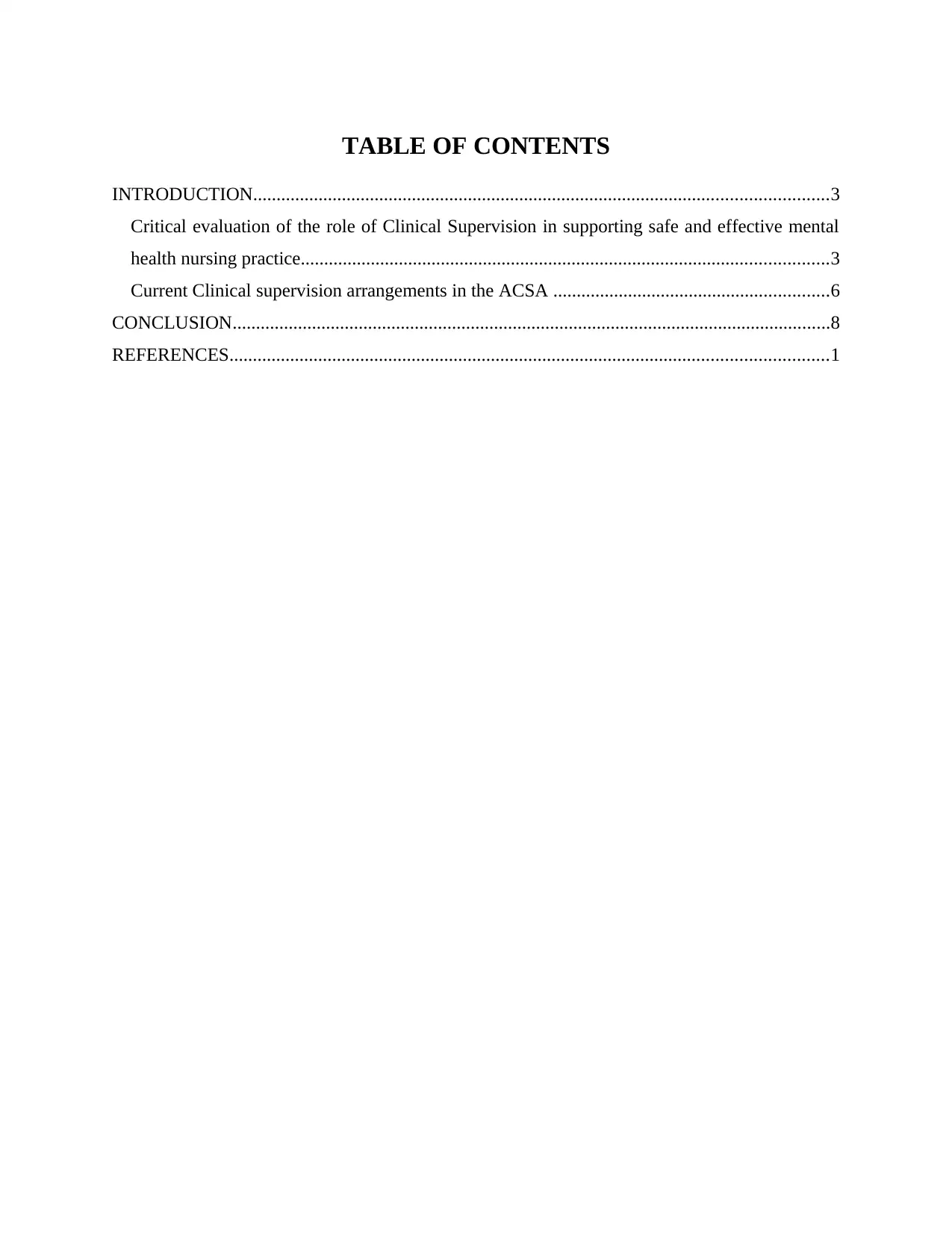
TABLE OF CONTENTS
INTRODUCTION...........................................................................................................................3
Critical evaluation of the role of Clinical Supervision in supporting safe and effective mental
health nursing practice.................................................................................................................3
Current Clinical supervision arrangements in the ACSA ...........................................................6
CONCLUSION................................................................................................................................8
REFERENCES................................................................................................................................1
INTRODUCTION...........................................................................................................................3
Critical evaluation of the role of Clinical Supervision in supporting safe and effective mental
health nursing practice.................................................................................................................3
Current Clinical supervision arrangements in the ACSA ...........................................................6
CONCLUSION................................................................................................................................8
REFERENCES................................................................................................................................1
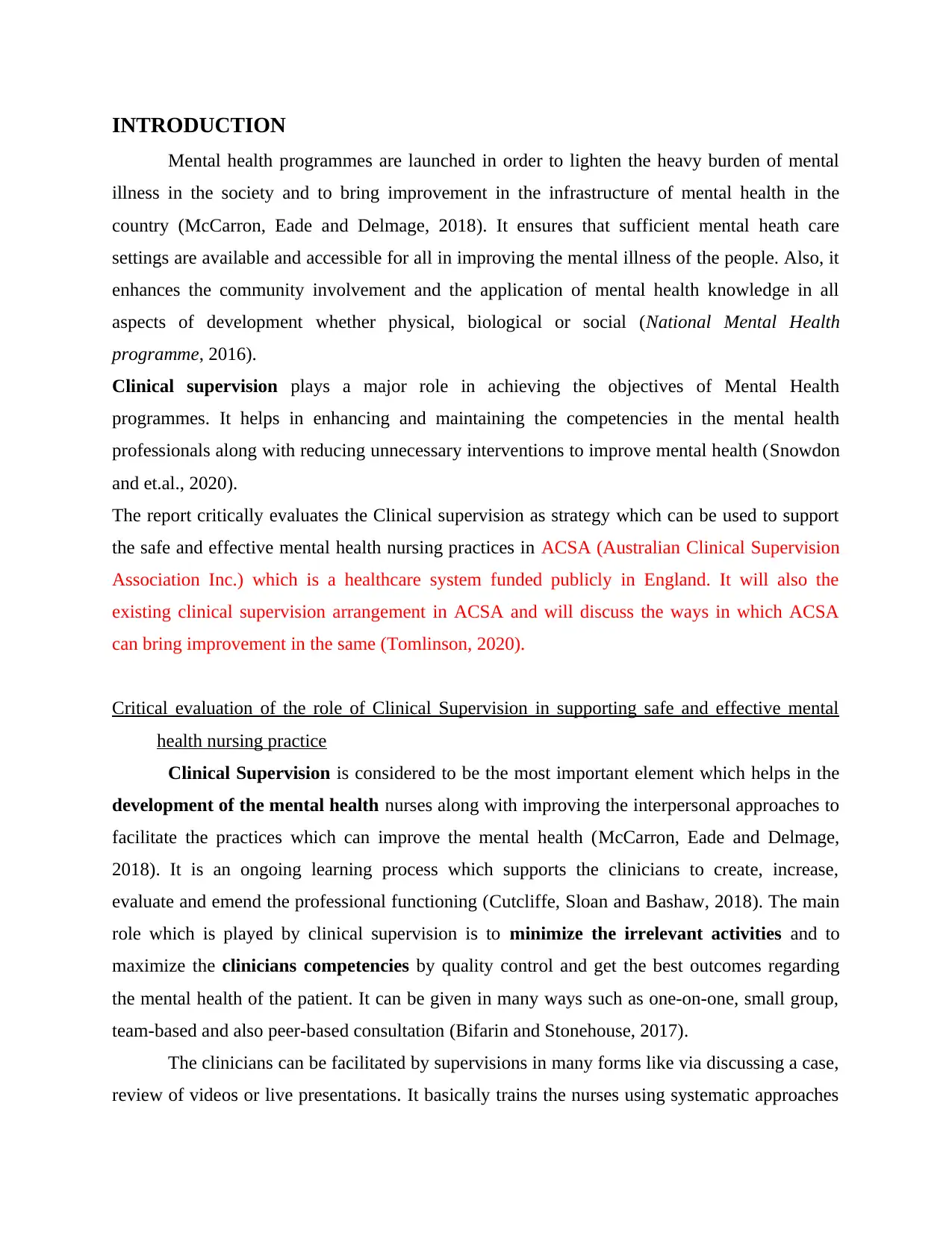
INTRODUCTION
Mental health programmes are launched in order to lighten the heavy burden of mental
illness in the society and to bring improvement in the infrastructure of mental health in the
country (McCarron, Eade and Delmage, 2018). It ensures that sufficient mental heath care
settings are available and accessible for all in improving the mental illness of the people. Also, it
enhances the community involvement and the application of mental health knowledge in all
aspects of development whether physical, biological or social (National Mental Health
programme, 2016).
Clinical supervision plays a major role in achieving the objectives of Mental Health
programmes. It helps in enhancing and maintaining the competencies in the mental health
professionals along with reducing unnecessary interventions to improve mental health (Snowdon
and et.al., 2020).
The report critically evaluates the Clinical supervision as strategy which can be used to support
the safe and effective mental health nursing practices in ACSA (Australian Clinical Supervision
Association Inc.) which is a healthcare system funded publicly in England. It will also the
existing clinical supervision arrangement in ACSA and will discuss the ways in which ACSA
can bring improvement in the same (Tomlinson, 2020).
Critical evaluation of the role of Clinical Supervision in supporting safe and effective mental
health nursing practice
Clinical Supervision is considered to be the most important element which helps in the
development of the mental health nurses along with improving the interpersonal approaches to
facilitate the practices which can improve the mental health (McCarron, Eade and Delmage,
2018). It is an ongoing learning process which supports the clinicians to create, increase,
evaluate and emend the professional functioning (Cutcliffe, Sloan and Bashaw, 2018). The main
role which is played by clinical supervision is to minimize the irrelevant activities and to
maximize the clinicians competencies by quality control and get the best outcomes regarding
the mental health of the patient. It can be given in many ways such as one-on-one, small group,
team-based and also peer-based consultation (Bifarin and Stonehouse, 2017).
The clinicians can be facilitated by supervisions in many forms like via discussing a case,
review of videos or live presentations. It basically trains the nurses using systematic approaches
Mental health programmes are launched in order to lighten the heavy burden of mental
illness in the society and to bring improvement in the infrastructure of mental health in the
country (McCarron, Eade and Delmage, 2018). It ensures that sufficient mental heath care
settings are available and accessible for all in improving the mental illness of the people. Also, it
enhances the community involvement and the application of mental health knowledge in all
aspects of development whether physical, biological or social (National Mental Health
programme, 2016).
Clinical supervision plays a major role in achieving the objectives of Mental Health
programmes. It helps in enhancing and maintaining the competencies in the mental health
professionals along with reducing unnecessary interventions to improve mental health (Snowdon
and et.al., 2020).
The report critically evaluates the Clinical supervision as strategy which can be used to support
the safe and effective mental health nursing practices in ACSA (Australian Clinical Supervision
Association Inc.) which is a healthcare system funded publicly in England. It will also the
existing clinical supervision arrangement in ACSA and will discuss the ways in which ACSA
can bring improvement in the same (Tomlinson, 2020).
Critical evaluation of the role of Clinical Supervision in supporting safe and effective mental
health nursing practice
Clinical Supervision is considered to be the most important element which helps in the
development of the mental health nurses along with improving the interpersonal approaches to
facilitate the practices which can improve the mental health (McCarron, Eade and Delmage,
2018). It is an ongoing learning process which supports the clinicians to create, increase,
evaluate and emend the professional functioning (Cutcliffe, Sloan and Bashaw, 2018). The main
role which is played by clinical supervision is to minimize the irrelevant activities and to
maximize the clinicians competencies by quality control and get the best outcomes regarding
the mental health of the patient. It can be given in many ways such as one-on-one, small group,
team-based and also peer-based consultation (Bifarin and Stonehouse, 2017).
The clinicians can be facilitated by supervisions in many forms like via discussing a case,
review of videos or live presentations. It basically trains the nurses using systematic approaches
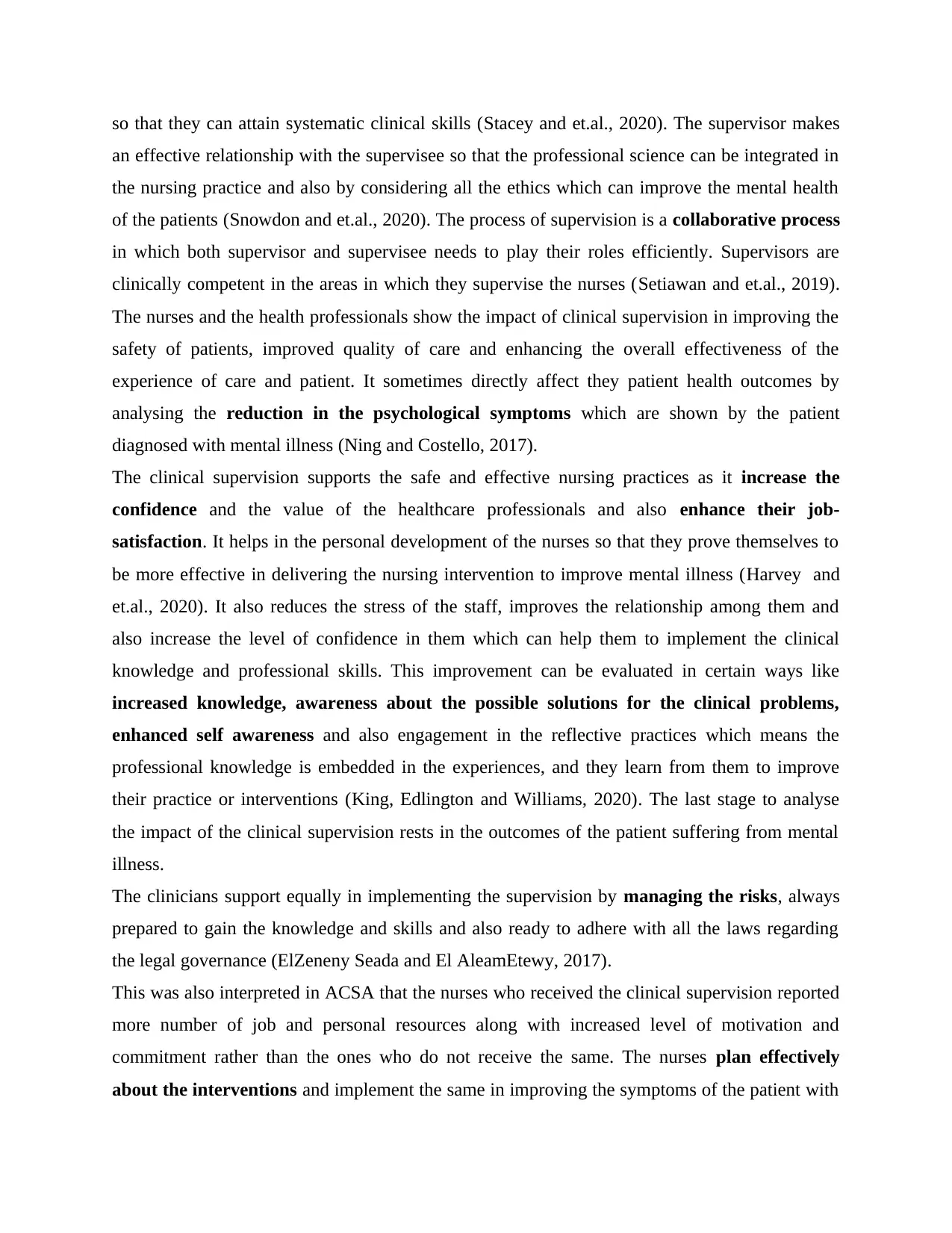
so that they can attain systematic clinical skills (Stacey and et.al., 2020). The supervisor makes
an effective relationship with the supervisee so that the professional science can be integrated in
the nursing practice and also by considering all the ethics which can improve the mental health
of the patients (Snowdon and et.al., 2020). The process of supervision is a collaborative process
in which both supervisor and supervisee needs to play their roles efficiently. Supervisors are
clinically competent in the areas in which they supervise the nurses (Setiawan and et.al., 2019).
The nurses and the health professionals show the impact of clinical supervision in improving the
safety of patients, improved quality of care and enhancing the overall effectiveness of the
experience of care and patient. It sometimes directly affect they patient health outcomes by
analysing the reduction in the psychological symptoms which are shown by the patient
diagnosed with mental illness (Ning and Costello, 2017).
The clinical supervision supports the safe and effective nursing practices as it increase the
confidence and the value of the healthcare professionals and also enhance their job-
satisfaction. It helps in the personal development of the nurses so that they prove themselves to
be more effective in delivering the nursing intervention to improve mental illness (Harvey and
et.al., 2020). It also reduces the stress of the staff, improves the relationship among them and
also increase the level of confidence in them which can help them to implement the clinical
knowledge and professional skills. This improvement can be evaluated in certain ways like
increased knowledge, awareness about the possible solutions for the clinical problems,
enhanced self awareness and also engagement in the reflective practices which means the
professional knowledge is embedded in the experiences, and they learn from them to improve
their practice or interventions (King, Edlington and Williams, 2020). The last stage to analyse
the impact of the clinical supervision rests in the outcomes of the patient suffering from mental
illness.
The clinicians support equally in implementing the supervision by managing the risks, always
prepared to gain the knowledge and skills and also ready to adhere with all the laws regarding
the legal governance (ElZeneny Seada and El AleamEtewy, 2017).
This was also interpreted in ACSA that the nurses who received the clinical supervision reported
more number of job and personal resources along with increased level of motivation and
commitment rather than the ones who do not receive the same. The nurses plan effectively
about the interventions and implement the same in improving the symptoms of the patient with
an effective relationship with the supervisee so that the professional science can be integrated in
the nursing practice and also by considering all the ethics which can improve the mental health
of the patients (Snowdon and et.al., 2020). The process of supervision is a collaborative process
in which both supervisor and supervisee needs to play their roles efficiently. Supervisors are
clinically competent in the areas in which they supervise the nurses (Setiawan and et.al., 2019).
The nurses and the health professionals show the impact of clinical supervision in improving the
safety of patients, improved quality of care and enhancing the overall effectiveness of the
experience of care and patient. It sometimes directly affect they patient health outcomes by
analysing the reduction in the psychological symptoms which are shown by the patient
diagnosed with mental illness (Ning and Costello, 2017).
The clinical supervision supports the safe and effective nursing practices as it increase the
confidence and the value of the healthcare professionals and also enhance their job-
satisfaction. It helps in the personal development of the nurses so that they prove themselves to
be more effective in delivering the nursing intervention to improve mental illness (Harvey and
et.al., 2020). It also reduces the stress of the staff, improves the relationship among them and
also increase the level of confidence in them which can help them to implement the clinical
knowledge and professional skills. This improvement can be evaluated in certain ways like
increased knowledge, awareness about the possible solutions for the clinical problems,
enhanced self awareness and also engagement in the reflective practices which means the
professional knowledge is embedded in the experiences, and they learn from them to improve
their practice or interventions (King, Edlington and Williams, 2020). The last stage to analyse
the impact of the clinical supervision rests in the outcomes of the patient suffering from mental
illness.
The clinicians support equally in implementing the supervision by managing the risks, always
prepared to gain the knowledge and skills and also ready to adhere with all the laws regarding
the legal governance (ElZeneny Seada and El AleamEtewy, 2017).
This was also interpreted in ACSA that the nurses who received the clinical supervision reported
more number of job and personal resources along with increased level of motivation and
commitment rather than the ones who do not receive the same. The nurses plan effectively
about the interventions and implement the same in improving the symptoms of the patient with
Secure Best Marks with AI Grader
Need help grading? Try our AI Grader for instant feedback on your assignments.
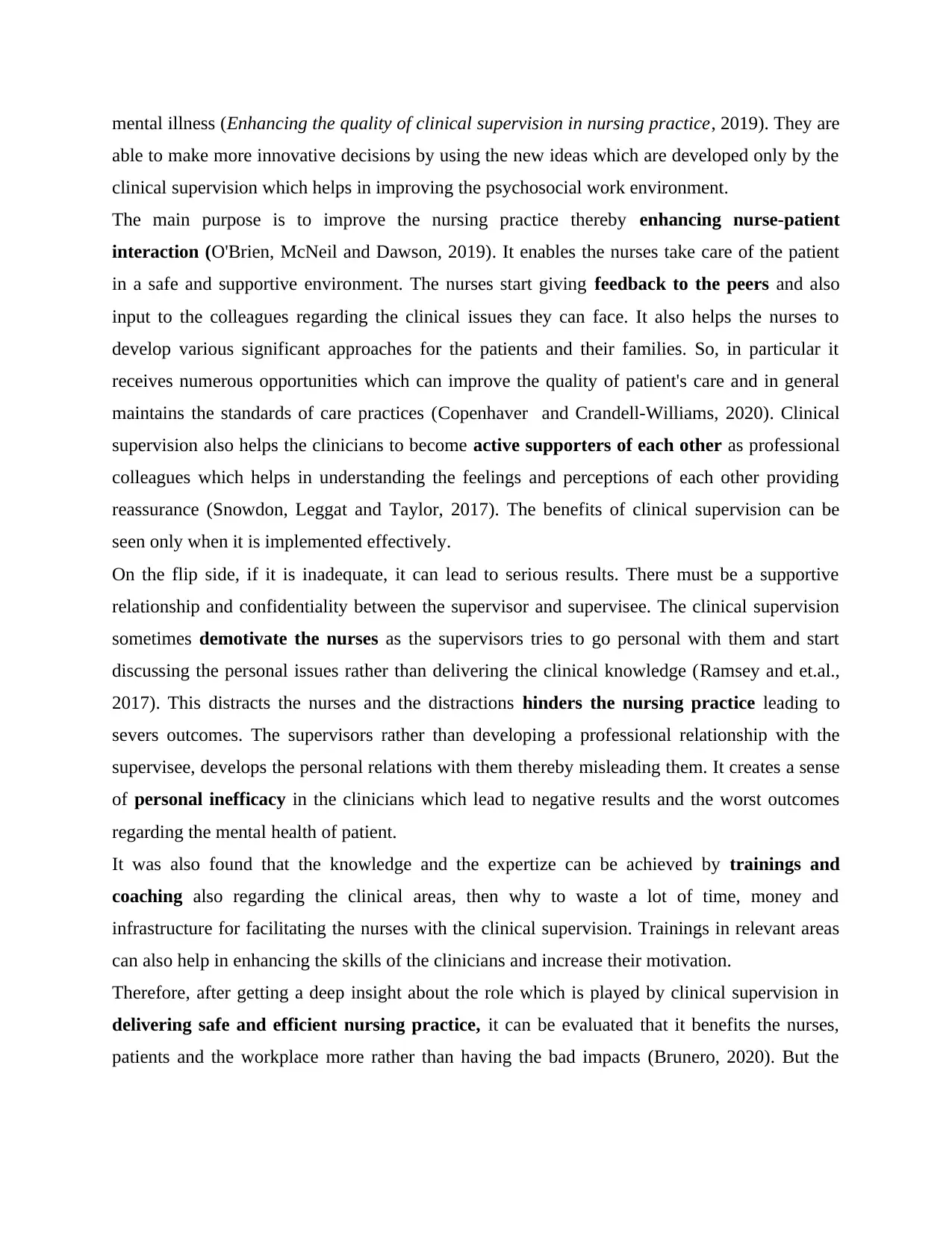
mental illness (Enhancing the quality of clinical supervision in nursing practice, 2019). They are
able to make more innovative decisions by using the new ideas which are developed only by the
clinical supervision which helps in improving the psychosocial work environment.
The main purpose is to improve the nursing practice thereby enhancing nurse-patient
interaction (O'Brien, McNeil and Dawson, 2019). It enables the nurses take care of the patient
in a safe and supportive environment. The nurses start giving feedback to the peers and also
input to the colleagues regarding the clinical issues they can face. It also helps the nurses to
develop various significant approaches for the patients and their families. So, in particular it
receives numerous opportunities which can improve the quality of patient's care and in general
maintains the standards of care practices (Copenhaver and Crandell-Williams, 2020). Clinical
supervision also helps the clinicians to become active supporters of each other as professional
colleagues which helps in understanding the feelings and perceptions of each other providing
reassurance (Snowdon, Leggat and Taylor, 2017). The benefits of clinical supervision can be
seen only when it is implemented effectively.
On the flip side, if it is inadequate, it can lead to serious results. There must be a supportive
relationship and confidentiality between the supervisor and supervisee. The clinical supervision
sometimes demotivate the nurses as the supervisors tries to go personal with them and start
discussing the personal issues rather than delivering the clinical knowledge (Ramsey and et.al.,
2017). This distracts the nurses and the distractions hinders the nursing practice leading to
severs outcomes. The supervisors rather than developing a professional relationship with the
supervisee, develops the personal relations with them thereby misleading them. It creates a sense
of personal inefficacy in the clinicians which lead to negative results and the worst outcomes
regarding the mental health of patient.
It was also found that the knowledge and the expertize can be achieved by trainings and
coaching also regarding the clinical areas, then why to waste a lot of time, money and
infrastructure for facilitating the nurses with the clinical supervision. Trainings in relevant areas
can also help in enhancing the skills of the clinicians and increase their motivation.
Therefore, after getting a deep insight about the role which is played by clinical supervision in
delivering safe and efficient nursing practice, it can be evaluated that it benefits the nurses,
patients and the workplace more rather than having the bad impacts (Brunero, 2020). But the
able to make more innovative decisions by using the new ideas which are developed only by the
clinical supervision which helps in improving the psychosocial work environment.
The main purpose is to improve the nursing practice thereby enhancing nurse-patient
interaction (O'Brien, McNeil and Dawson, 2019). It enables the nurses take care of the patient
in a safe and supportive environment. The nurses start giving feedback to the peers and also
input to the colleagues regarding the clinical issues they can face. It also helps the nurses to
develop various significant approaches for the patients and their families. So, in particular it
receives numerous opportunities which can improve the quality of patient's care and in general
maintains the standards of care practices (Copenhaver and Crandell-Williams, 2020). Clinical
supervision also helps the clinicians to become active supporters of each other as professional
colleagues which helps in understanding the feelings and perceptions of each other providing
reassurance (Snowdon, Leggat and Taylor, 2017). The benefits of clinical supervision can be
seen only when it is implemented effectively.
On the flip side, if it is inadequate, it can lead to serious results. There must be a supportive
relationship and confidentiality between the supervisor and supervisee. The clinical supervision
sometimes demotivate the nurses as the supervisors tries to go personal with them and start
discussing the personal issues rather than delivering the clinical knowledge (Ramsey and et.al.,
2017). This distracts the nurses and the distractions hinders the nursing practice leading to
severs outcomes. The supervisors rather than developing a professional relationship with the
supervisee, develops the personal relations with them thereby misleading them. It creates a sense
of personal inefficacy in the clinicians which lead to negative results and the worst outcomes
regarding the mental health of patient.
It was also found that the knowledge and the expertize can be achieved by trainings and
coaching also regarding the clinical areas, then why to waste a lot of time, money and
infrastructure for facilitating the nurses with the clinical supervision. Trainings in relevant areas
can also help in enhancing the skills of the clinicians and increase their motivation.
Therefore, after getting a deep insight about the role which is played by clinical supervision in
delivering safe and efficient nursing practice, it can be evaluated that it benefits the nurses,
patients and the workplace more rather than having the bad impacts (Brunero, 2020). But the

main thing to be focussed is on its effective implementation which can help in getting better
outcomes.
outcomes.
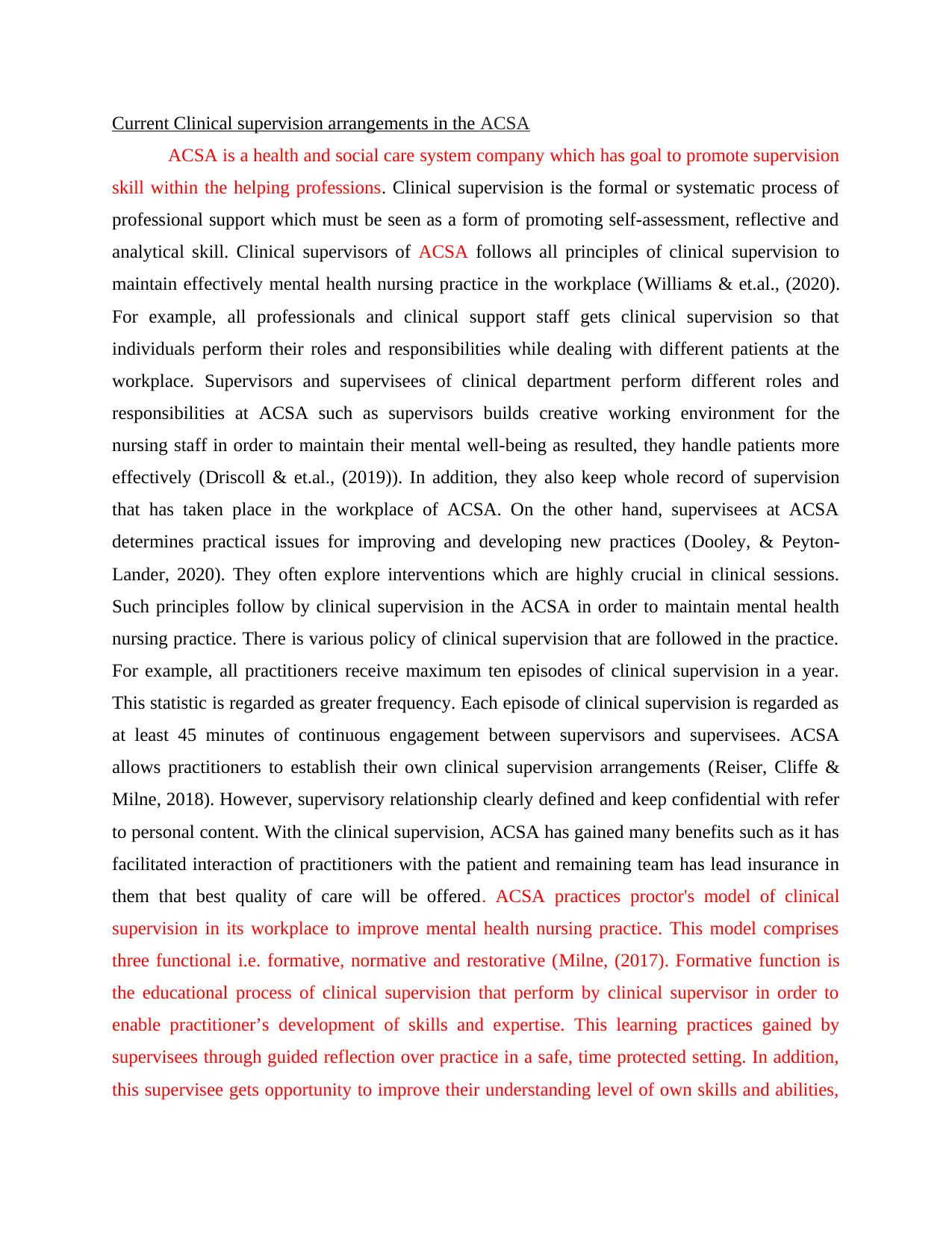
Current Clinical supervision arrangements in the ACSA
ACSA is a health and social care system company which has goal to promote supervision
skill within the helping professions. Clinical supervision is the formal or systematic process of
professional support which must be seen as a form of promoting self-assessment, reflective and
analytical skill. Clinical supervisors of ACSA follows all principles of clinical supervision to
maintain effectively mental health nursing practice in the workplace (Williams & et.al., (2020).
For example, all professionals and clinical support staff gets clinical supervision so that
individuals perform their roles and responsibilities while dealing with different patients at the
workplace. Supervisors and supervisees of clinical department perform different roles and
responsibilities at ACSA such as supervisors builds creative working environment for the
nursing staff in order to maintain their mental well-being as resulted, they handle patients more
effectively (Driscoll & et.al., (2019)). In addition, they also keep whole record of supervision
that has taken place in the workplace of ACSA. On the other hand, supervisees at ACSA
determines practical issues for improving and developing new practices (Dooley, & Peyton-
Lander, 2020). They often explore interventions which are highly crucial in clinical sessions.
Such principles follow by clinical supervision in the ACSA in order to maintain mental health
nursing practice. There is various policy of clinical supervision that are followed in the practice.
For example, all practitioners receive maximum ten episodes of clinical supervision in a year.
This statistic is regarded as greater frequency. Each episode of clinical supervision is regarded as
at least 45 minutes of continuous engagement between supervisors and supervisees. ACSA
allows practitioners to establish their own clinical supervision arrangements (Reiser, Cliffe &
Milne, 2018). However, supervisory relationship clearly defined and keep confidential with refer
to personal content. With the clinical supervision, ACSA has gained many benefits such as it has
facilitated interaction of practitioners with the patient and remaining team has lead insurance in
them that best quality of care will be offered. ACSA practices proctor's model of clinical
supervision in its workplace to improve mental health nursing practice. This model comprises
three functional i.e. formative, normative and restorative (Milne, (2017). Formative function is
the educational process of clinical supervision that perform by clinical supervisor in order to
enable practitioner’s development of skills and expertise. This learning practices gained by
supervisees through guided reflection over practice in a safe, time protected setting. In addition,
this supervisee gets opportunity to improve their understanding level of own skills and abilities,
ACSA is a health and social care system company which has goal to promote supervision
skill within the helping professions. Clinical supervision is the formal or systematic process of
professional support which must be seen as a form of promoting self-assessment, reflective and
analytical skill. Clinical supervisors of ACSA follows all principles of clinical supervision to
maintain effectively mental health nursing practice in the workplace (Williams & et.al., (2020).
For example, all professionals and clinical support staff gets clinical supervision so that
individuals perform their roles and responsibilities while dealing with different patients at the
workplace. Supervisors and supervisees of clinical department perform different roles and
responsibilities at ACSA such as supervisors builds creative working environment for the
nursing staff in order to maintain their mental well-being as resulted, they handle patients more
effectively (Driscoll & et.al., (2019)). In addition, they also keep whole record of supervision
that has taken place in the workplace of ACSA. On the other hand, supervisees at ACSA
determines practical issues for improving and developing new practices (Dooley, & Peyton-
Lander, 2020). They often explore interventions which are highly crucial in clinical sessions.
Such principles follow by clinical supervision in the ACSA in order to maintain mental health
nursing practice. There is various policy of clinical supervision that are followed in the practice.
For example, all practitioners receive maximum ten episodes of clinical supervision in a year.
This statistic is regarded as greater frequency. Each episode of clinical supervision is regarded as
at least 45 minutes of continuous engagement between supervisors and supervisees. ACSA
allows practitioners to establish their own clinical supervision arrangements (Reiser, Cliffe &
Milne, 2018). However, supervisory relationship clearly defined and keep confidential with refer
to personal content. With the clinical supervision, ACSA has gained many benefits such as it has
facilitated interaction of practitioners with the patient and remaining team has lead insurance in
them that best quality of care will be offered. ACSA practices proctor's model of clinical
supervision in its workplace to improve mental health nursing practice. This model comprises
three functional i.e. formative, normative and restorative (Milne, (2017). Formative function is
the educational process of clinical supervision that perform by clinical supervisor in order to
enable practitioner’s development of skills and expertise. This learning practices gained by
supervisees through guided reflection over practice in a safe, time protected setting. In addition,
this supervisee gets opportunity to improve their understanding level of own skills and abilities,
Paraphrase This Document
Need a fresh take? Get an instant paraphrase of this document with our AI Paraphraser
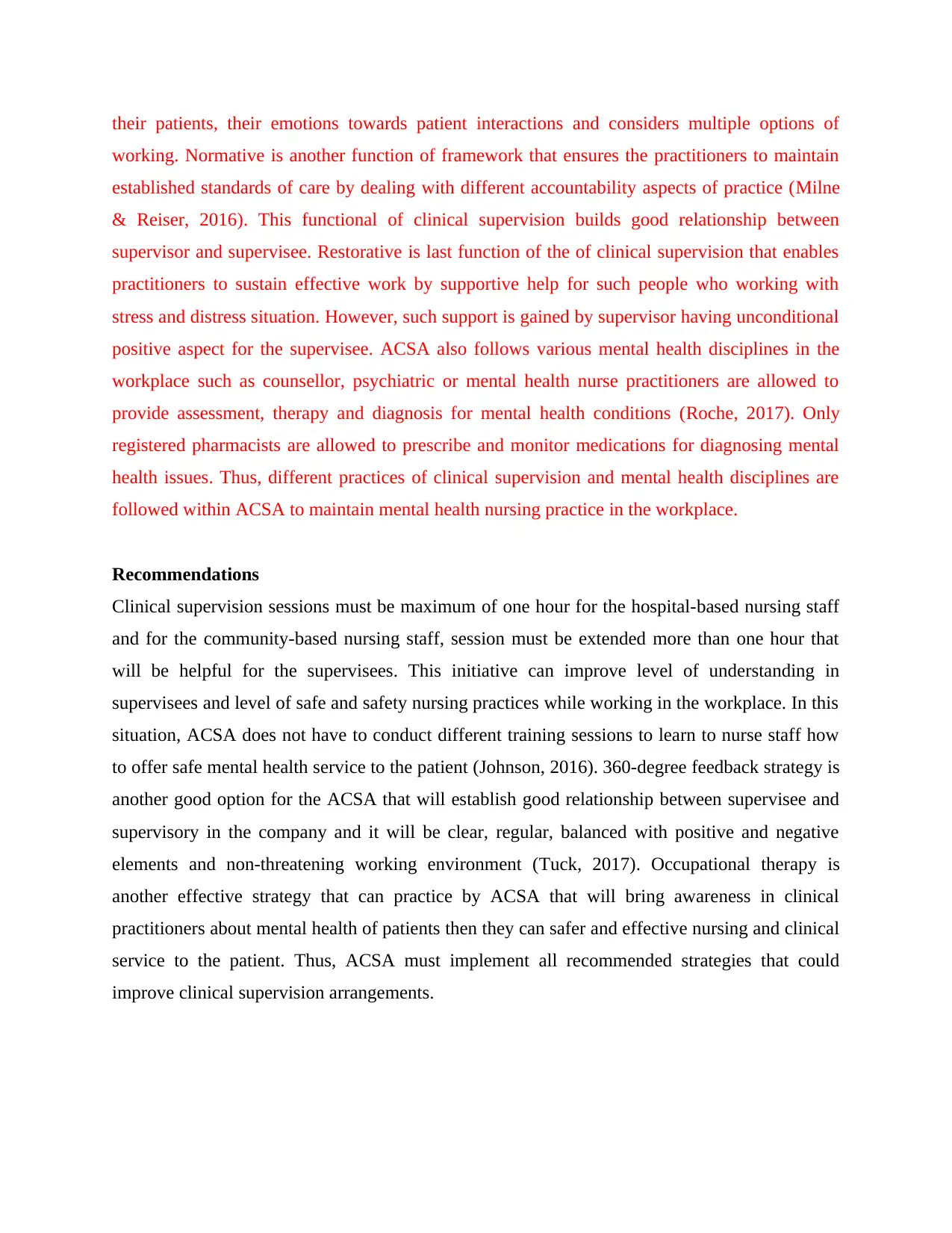
their patients, their emotions towards patient interactions and considers multiple options of
working. Normative is another function of framework that ensures the practitioners to maintain
established standards of care by dealing with different accountability aspects of practice (Milne
& Reiser, 2016). This functional of clinical supervision builds good relationship between
supervisor and supervisee. Restorative is last function of the of clinical supervision that enables
practitioners to sustain effective work by supportive help for such people who working with
stress and distress situation. However, such support is gained by supervisor having unconditional
positive aspect for the supervisee. ACSA also follows various mental health disciplines in the
workplace such as counsellor, psychiatric or mental health nurse practitioners are allowed to
provide assessment, therapy and diagnosis for mental health conditions (Roche, 2017). Only
registered pharmacists are allowed to prescribe and monitor medications for diagnosing mental
health issues. Thus, different practices of clinical supervision and mental health disciplines are
followed within ACSA to maintain mental health nursing practice in the workplace.
Recommendations
Clinical supervision sessions must be maximum of one hour for the hospital-based nursing staff
and for the community-based nursing staff, session must be extended more than one hour that
will be helpful for the supervisees. This initiative can improve level of understanding in
supervisees and level of safe and safety nursing practices while working in the workplace. In this
situation, ACSA does not have to conduct different training sessions to learn to nurse staff how
to offer safe mental health service to the patient (Johnson, 2016). 360-degree feedback strategy is
another good option for the ACSA that will establish good relationship between supervisee and
supervisory in the company and it will be clear, regular, balanced with positive and negative
elements and non-threatening working environment (Tuck, 2017). Occupational therapy is
another effective strategy that can practice by ACSA that will bring awareness in clinical
practitioners about mental health of patients then they can safer and effective nursing and clinical
service to the patient. Thus, ACSA must implement all recommended strategies that could
improve clinical supervision arrangements.
working. Normative is another function of framework that ensures the practitioners to maintain
established standards of care by dealing with different accountability aspects of practice (Milne
& Reiser, 2016). This functional of clinical supervision builds good relationship between
supervisor and supervisee. Restorative is last function of the of clinical supervision that enables
practitioners to sustain effective work by supportive help for such people who working with
stress and distress situation. However, such support is gained by supervisor having unconditional
positive aspect for the supervisee. ACSA also follows various mental health disciplines in the
workplace such as counsellor, psychiatric or mental health nurse practitioners are allowed to
provide assessment, therapy and diagnosis for mental health conditions (Roche, 2017). Only
registered pharmacists are allowed to prescribe and monitor medications for diagnosing mental
health issues. Thus, different practices of clinical supervision and mental health disciplines are
followed within ACSA to maintain mental health nursing practice in the workplace.
Recommendations
Clinical supervision sessions must be maximum of one hour for the hospital-based nursing staff
and for the community-based nursing staff, session must be extended more than one hour that
will be helpful for the supervisees. This initiative can improve level of understanding in
supervisees and level of safe and safety nursing practices while working in the workplace. In this
situation, ACSA does not have to conduct different training sessions to learn to nurse staff how
to offer safe mental health service to the patient (Johnson, 2016). 360-degree feedback strategy is
another good option for the ACSA that will establish good relationship between supervisee and
supervisory in the company and it will be clear, regular, balanced with positive and negative
elements and non-threatening working environment (Tuck, 2017). Occupational therapy is
another effective strategy that can practice by ACSA that will bring awareness in clinical
practitioners about mental health of patients then they can safer and effective nursing and clinical
service to the patient. Thus, ACSA must implement all recommended strategies that could
improve clinical supervision arrangements.
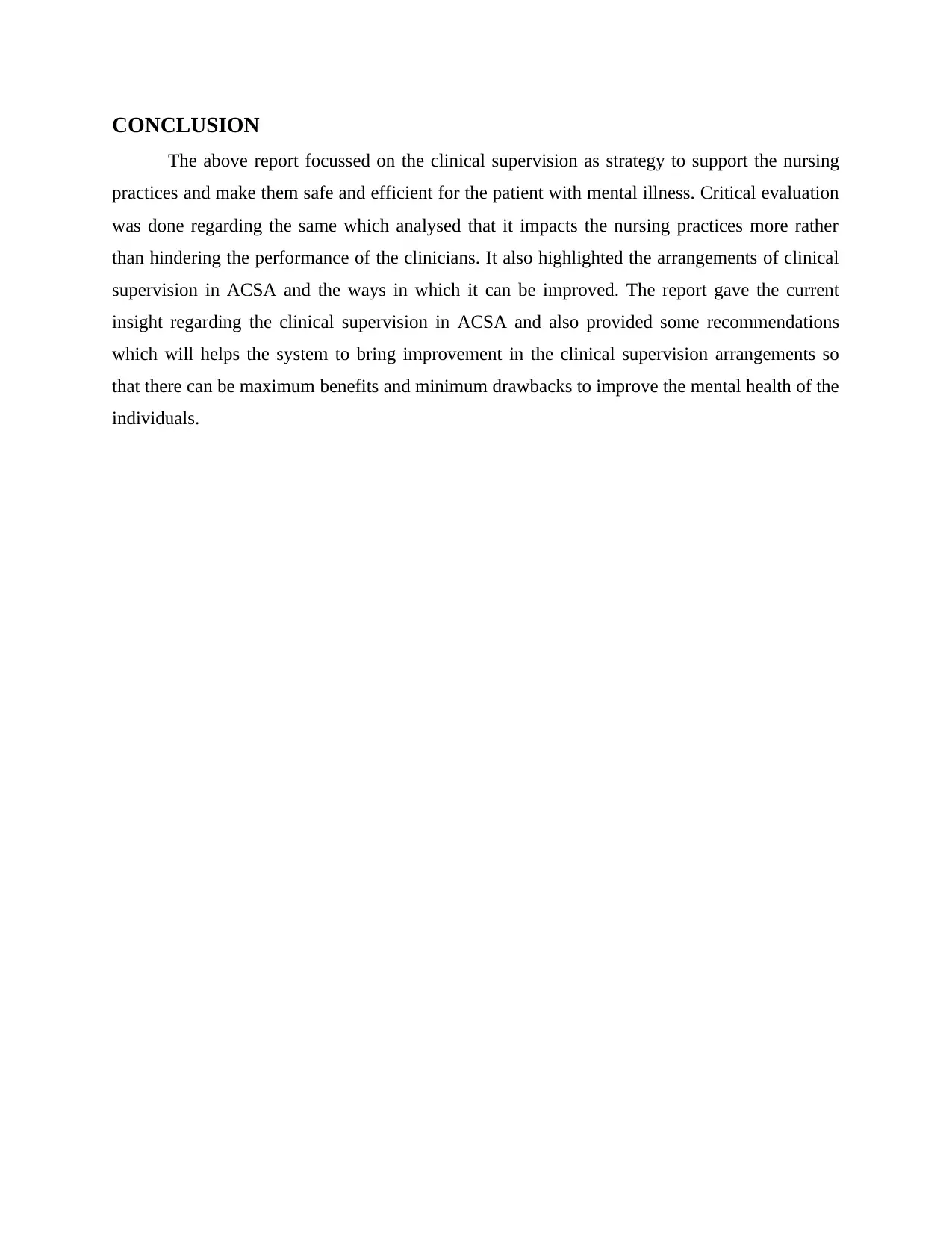
CONCLUSION
The above report focussed on the clinical supervision as strategy to support the nursing
practices and make them safe and efficient for the patient with mental illness. Critical evaluation
was done regarding the same which analysed that it impacts the nursing practices more rather
than hindering the performance of the clinicians. It also highlighted the arrangements of clinical
supervision in ACSA and the ways in which it can be improved. The report gave the current
insight regarding the clinical supervision in ACSA and also provided some recommendations
which will helps the system to bring improvement in the clinical supervision arrangements so
that there can be maximum benefits and minimum drawbacks to improve the mental health of the
individuals.
The above report focussed on the clinical supervision as strategy to support the nursing
practices and make them safe and efficient for the patient with mental illness. Critical evaluation
was done regarding the same which analysed that it impacts the nursing practices more rather
than hindering the performance of the clinicians. It also highlighted the arrangements of clinical
supervision in ACSA and the ways in which it can be improved. The report gave the current
insight regarding the clinical supervision in ACSA and also provided some recommendations
which will helps the system to bring improvement in the clinical supervision arrangements so
that there can be maximum benefits and minimum drawbacks to improve the mental health of the
individuals.
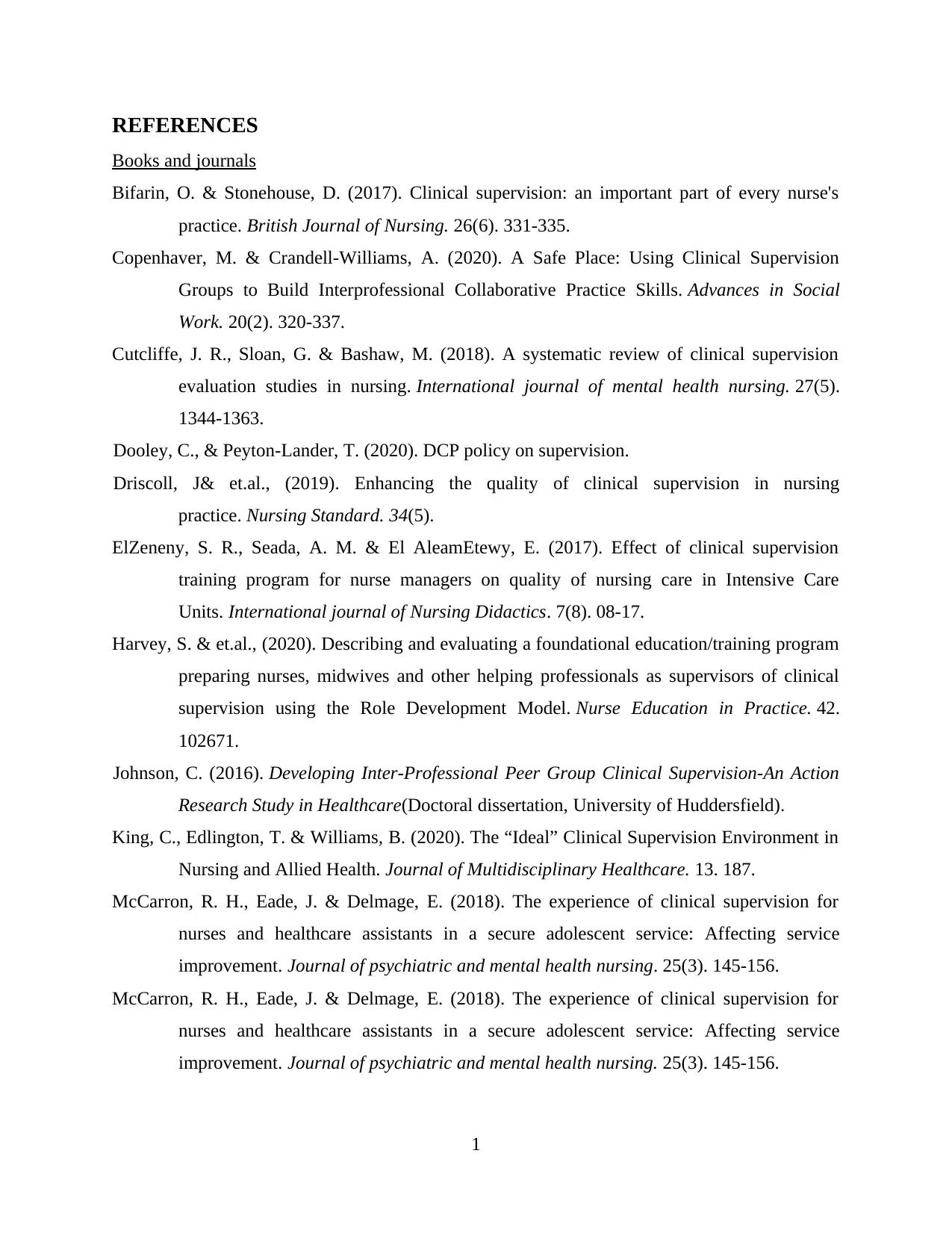
REFERENCES
Books and journals
Bifarin, O. & Stonehouse, D. (2017). Clinical supervision: an important part of every nurse's
practice. British Journal of Nursing. 26(6). 331-335.
Copenhaver, M. & Crandell-Williams, A. (2020). A Safe Place: Using Clinical Supervision
Groups to Build Interprofessional Collaborative Practice Skills. Advances in Social
Work. 20(2). 320-337.
Cutcliffe, J. R., Sloan, G. & Bashaw, M. (2018). A systematic review of clinical supervision
evaluation studies in nursing. International journal of mental health nursing. 27(5).
1344-1363.
Dooley, C., & Peyton-Lander, T. (2020). DCP policy on supervision.
Driscoll, J& et.al., (2019). Enhancing the quality of clinical supervision in nursing
practice. Nursing Standard. 34(5).
ElZeneny, S. R., Seada, A. M. & El AleamEtewy, E. (2017). Effect of clinical supervision
training program for nurse managers on quality of nursing care in Intensive Care
Units. International journal of Nursing Didactics. 7(8). 08-17.
Harvey, S. & et.al., (2020). Describing and evaluating a foundational education/training program
preparing nurses, midwives and other helping professionals as supervisors of clinical
supervision using the Role Development Model. Nurse Education in Practice. 42.
102671.
Johnson, C. (2016). Developing Inter-Professional Peer Group Clinical Supervision-An Action
Research Study in Healthcare(Doctoral dissertation, University of Huddersfield).
King, C., Edlington, T. & Williams, B. (2020). The “Ideal” Clinical Supervision Environment in
Nursing and Allied Health. Journal of Multidisciplinary Healthcare. 13. 187.
McCarron, R. H., Eade, J. & Delmage, E. (2018). The experience of clinical supervision for
nurses and healthcare assistants in a secure adolescent service: Affecting service
improvement. Journal of psychiatric and mental health nursing. 25(3). 145-156.
McCarron, R. H., Eade, J. & Delmage, E. (2018). The experience of clinical supervision for
nurses and healthcare assistants in a secure adolescent service: Affecting service
improvement. Journal of psychiatric and mental health nursing. 25(3). 145-156.
1
Books and journals
Bifarin, O. & Stonehouse, D. (2017). Clinical supervision: an important part of every nurse's
practice. British Journal of Nursing. 26(6). 331-335.
Copenhaver, M. & Crandell-Williams, A. (2020). A Safe Place: Using Clinical Supervision
Groups to Build Interprofessional Collaborative Practice Skills. Advances in Social
Work. 20(2). 320-337.
Cutcliffe, J. R., Sloan, G. & Bashaw, M. (2018). A systematic review of clinical supervision
evaluation studies in nursing. International journal of mental health nursing. 27(5).
1344-1363.
Dooley, C., & Peyton-Lander, T. (2020). DCP policy on supervision.
Driscoll, J& et.al., (2019). Enhancing the quality of clinical supervision in nursing
practice. Nursing Standard. 34(5).
ElZeneny, S. R., Seada, A. M. & El AleamEtewy, E. (2017). Effect of clinical supervision
training program for nurse managers on quality of nursing care in Intensive Care
Units. International journal of Nursing Didactics. 7(8). 08-17.
Harvey, S. & et.al., (2020). Describing and evaluating a foundational education/training program
preparing nurses, midwives and other helping professionals as supervisors of clinical
supervision using the Role Development Model. Nurse Education in Practice. 42.
102671.
Johnson, C. (2016). Developing Inter-Professional Peer Group Clinical Supervision-An Action
Research Study in Healthcare(Doctoral dissertation, University of Huddersfield).
King, C., Edlington, T. & Williams, B. (2020). The “Ideal” Clinical Supervision Environment in
Nursing and Allied Health. Journal of Multidisciplinary Healthcare. 13. 187.
McCarron, R. H., Eade, J. & Delmage, E. (2018). The experience of clinical supervision for
nurses and healthcare assistants in a secure adolescent service: Affecting service
improvement. Journal of psychiatric and mental health nursing. 25(3). 145-156.
McCarron, R. H., Eade, J. & Delmage, E. (2018). The experience of clinical supervision for
nurses and healthcare assistants in a secure adolescent service: Affecting service
improvement. Journal of psychiatric and mental health nursing. 25(3). 145-156.
1
Secure Best Marks with AI Grader
Need help grading? Try our AI Grader for instant feedback on your assignments.
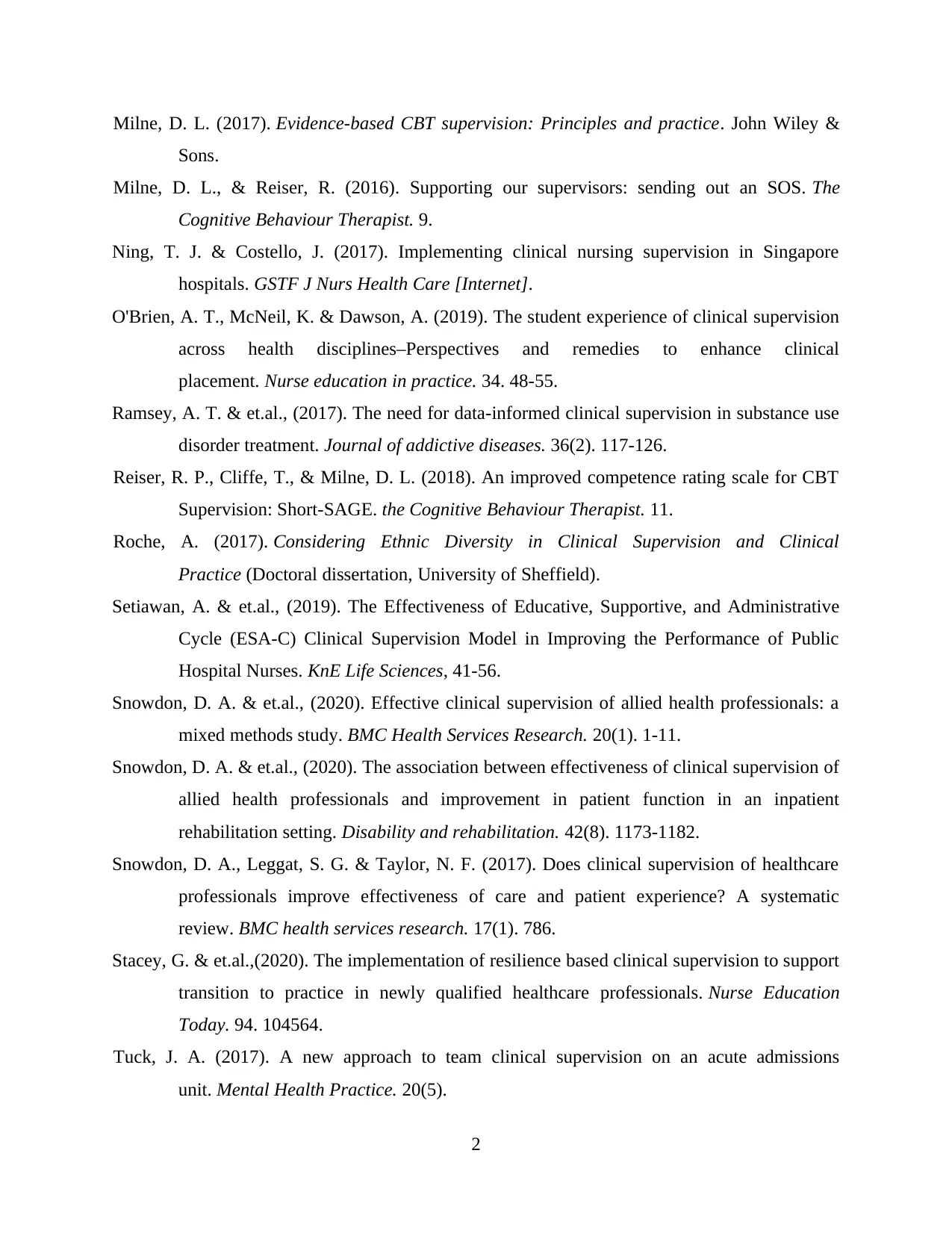
Milne, D. L. (2017). Evidence-based CBT supervision: Principles and practice. John Wiley &
Sons.
Milne, D. L., & Reiser, R. (2016). Supporting our supervisors: sending out an SOS. The
Cognitive Behaviour Therapist. 9.
Ning, T. J. & Costello, J. (2017). Implementing clinical nursing supervision in Singapore
hospitals. GSTF J Nurs Health Care [Internet].
O'Brien, A. T., McNeil, K. & Dawson, A. (2019). The student experience of clinical supervision
across health disciplines–Perspectives and remedies to enhance clinical
placement. Nurse education in practice. 34. 48-55.
Ramsey, A. T. & et.al., (2017). The need for data-informed clinical supervision in substance use
disorder treatment. Journal of addictive diseases. 36(2). 117-126.
Reiser, R. P., Cliffe, T., & Milne, D. L. (2018). An improved competence rating scale for CBT
Supervision: Short-SAGE. the Cognitive Behaviour Therapist. 11.
Roche, A. (2017). Considering Ethnic Diversity in Clinical Supervision and Clinical
Practice (Doctoral dissertation, University of Sheffield).
Setiawan, A. & et.al., (2019). The Effectiveness of Educative, Supportive, and Administrative
Cycle (ESA-C) Clinical Supervision Model in Improving the Performance of Public
Hospital Nurses. KnE Life Sciences, 41-56.
Snowdon, D. A. & et.al., (2020). Effective clinical supervision of allied health professionals: a
mixed methods study. BMC Health Services Research. 20(1). 1-11.
Snowdon, D. A. & et.al., (2020). The association between effectiveness of clinical supervision of
allied health professionals and improvement in patient function in an inpatient
rehabilitation setting. Disability and rehabilitation. 42(8). 1173-1182.
Snowdon, D. A., Leggat, S. G. & Taylor, N. F. (2017). Does clinical supervision of healthcare
professionals improve effectiveness of care and patient experience? A systematic
review. BMC health services research. 17(1). 786.
Stacey, G. & et.al.,(2020). The implementation of resilience based clinical supervision to support
transition to practice in newly qualified healthcare professionals. Nurse Education
Today. 94. 104564.
Tuck, J. A. (2017). A new approach to team clinical supervision on an acute admissions
unit. Mental Health Practice. 20(5).
2
Sons.
Milne, D. L., & Reiser, R. (2016). Supporting our supervisors: sending out an SOS. The
Cognitive Behaviour Therapist. 9.
Ning, T. J. & Costello, J. (2017). Implementing clinical nursing supervision in Singapore
hospitals. GSTF J Nurs Health Care [Internet].
O'Brien, A. T., McNeil, K. & Dawson, A. (2019). The student experience of clinical supervision
across health disciplines–Perspectives and remedies to enhance clinical
placement. Nurse education in practice. 34. 48-55.
Ramsey, A. T. & et.al., (2017). The need for data-informed clinical supervision in substance use
disorder treatment. Journal of addictive diseases. 36(2). 117-126.
Reiser, R. P., Cliffe, T., & Milne, D. L. (2018). An improved competence rating scale for CBT
Supervision: Short-SAGE. the Cognitive Behaviour Therapist. 11.
Roche, A. (2017). Considering Ethnic Diversity in Clinical Supervision and Clinical
Practice (Doctoral dissertation, University of Sheffield).
Setiawan, A. & et.al., (2019). The Effectiveness of Educative, Supportive, and Administrative
Cycle (ESA-C) Clinical Supervision Model in Improving the Performance of Public
Hospital Nurses. KnE Life Sciences, 41-56.
Snowdon, D. A. & et.al., (2020). Effective clinical supervision of allied health professionals: a
mixed methods study. BMC Health Services Research. 20(1). 1-11.
Snowdon, D. A. & et.al., (2020). The association between effectiveness of clinical supervision of
allied health professionals and improvement in patient function in an inpatient
rehabilitation setting. Disability and rehabilitation. 42(8). 1173-1182.
Snowdon, D. A., Leggat, S. G. & Taylor, N. F. (2017). Does clinical supervision of healthcare
professionals improve effectiveness of care and patient experience? A systematic
review. BMC health services research. 17(1). 786.
Stacey, G. & et.al.,(2020). The implementation of resilience based clinical supervision to support
transition to practice in newly qualified healthcare professionals. Nurse Education
Today. 94. 104564.
Tuck, J. A. (2017). A new approach to team clinical supervision on an acute admissions
unit. Mental Health Practice. 20(5).
2
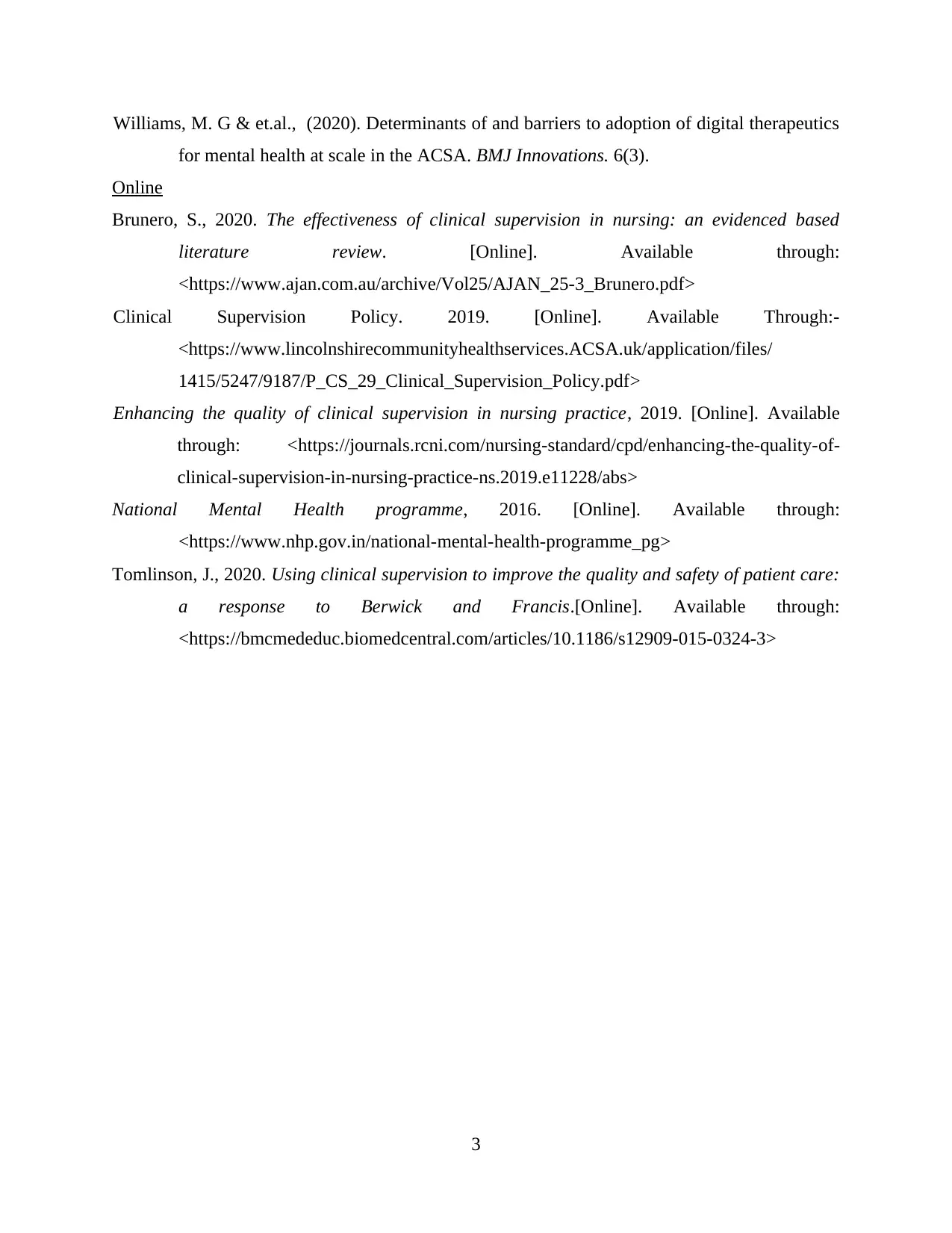
Williams, M. G & et.al., (2020). Determinants of and barriers to adoption of digital therapeutics
for mental health at scale in the ACSA. BMJ Innovations. 6(3).
Online
Brunero, S., 2020. The effectiveness of clinical supervision in nursing: an evidenced based
literature review. [Online]. Available through:
<https://www.ajan.com.au/archive/Vol25/AJAN_25-3_Brunero.pdf>
Clinical Supervision Policy. 2019. [Online]. Available Through:-
<https://www.lincolnshirecommunityhealthservices.ACSA.uk/application/files/
1415/5247/9187/P_CS_29_Clinical_Supervision_Policy.pdf>
Enhancing the quality of clinical supervision in nursing practice, 2019. [Online]. Available
through: <https://journals.rcni.com/nursing-standard/cpd/enhancing-the-quality-of-
clinical-supervision-in-nursing-practice-ns.2019.e11228/abs>
National Mental Health programme, 2016. [Online]. Available through:
<https://www.nhp.gov.in/national-mental-health-programme_pg>
Tomlinson, J., 2020. Using clinical supervision to improve the quality and safety of patient care:
a response to Berwick and Francis.[Online]. Available through:
<https://bmcmededuc.biomedcentral.com/articles/10.1186/s12909-015-0324-3>
3
for mental health at scale in the ACSA. BMJ Innovations. 6(3).
Online
Brunero, S., 2020. The effectiveness of clinical supervision in nursing: an evidenced based
literature review. [Online]. Available through:
<https://www.ajan.com.au/archive/Vol25/AJAN_25-3_Brunero.pdf>
Clinical Supervision Policy. 2019. [Online]. Available Through:-
<https://www.lincolnshirecommunityhealthservices.ACSA.uk/application/files/
1415/5247/9187/P_CS_29_Clinical_Supervision_Policy.pdf>
Enhancing the quality of clinical supervision in nursing practice, 2019. [Online]. Available
through: <https://journals.rcni.com/nursing-standard/cpd/enhancing-the-quality-of-
clinical-supervision-in-nursing-practice-ns.2019.e11228/abs>
National Mental Health programme, 2016. [Online]. Available through:
<https://www.nhp.gov.in/national-mental-health-programme_pg>
Tomlinson, J., 2020. Using clinical supervision to improve the quality and safety of patient care:
a response to Berwick and Francis.[Online]. Available through:
<https://bmcmededuc.biomedcentral.com/articles/10.1186/s12909-015-0324-3>
3
1 out of 12
Related Documents
Your All-in-One AI-Powered Toolkit for Academic Success.
+13062052269
info@desklib.com
Available 24*7 on WhatsApp / Email
![[object Object]](/_next/static/media/star-bottom.7253800d.svg)
Unlock your academic potential
© 2024 | Zucol Services PVT LTD | All rights reserved.





